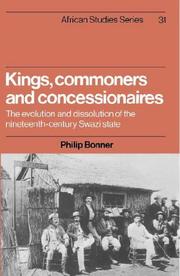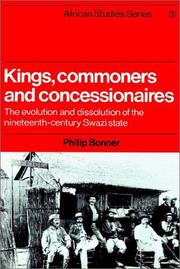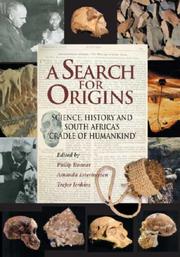| Listing 1 - 10 of 10 |
Sort by
|

ISBN: 0511563027 0521242703 0521523001 Year: 1983 Volume: 31 Publisher: Cambridge : Cambridge University Press,
Abstract | Keywords | Export | Availability | Bookmark
 Loading...
Loading...Choose an application
- Reference Manager
- EndNote
- RefWorks (Direct export to RefWorks)
This is the first full-length study of the political economy of one of the African states which were formed in the course of the nineteenth-century Zulu revolution. The early chapters examine the evolution of the Swazi state and the dynamics of its stratified systems, paying particular attention to the 'layering' of inequality through marriage and inheritance patterns, and the simultaneous integration of age regiments and the elaboration of a national ideology based on the Swazi royalty. Dr Bonner then sets the Swazi state in the wider context of south-eastern Africa and discusses its relations with the surrounding Boer societies. The later chapters analyse the role played by the great mining companies and their white concessionaires in the partition of southern Africa and in bringing about the dissolution of the Swazi state.
Swazi (African people) --- Amaswazi (African people) --- Isiswazi (African people) --- Ngwane (African people) --- Siswazi (African people) --- Swati (African people) --- Swazi (African tribe) --- Tekela (African people) --- Tekeza (African people) --- Bantu-speaking peoples --- Ethnology --- Nguni (African people) --- Politics and government. --- Eswatini --- Politics and government --- Swaziland --- Svazilend --- kaNgwane --- Umbuso weSwatini --- Kingdom of Swaziland --- Swaziland Government --- Ngwane --- Swasieland --- スワジランド --- Suwajirando --- スワージランド --- Arts and Humanities --- History

ISBN: 9780511563027 9780521242707 9780521523004 Year: 1983 Publisher: Cambridge Cambridge University Press
Abstract | Keywords | Export | Availability | Bookmark
 Loading...
Loading...Choose an application
- Reference Manager
- EndNote
- RefWorks (Direct export to RefWorks)
Book
ISBN: 1868146146 9781868146147 9781868144808 1868144801 Year: 2008 Publisher: Johannesburg Wits University Press
Abstract | Keywords | Export | Availability | Bookmark
 Loading...
Loading...Choose an application
- Reference Manager
- EndNote
- RefWorks (Direct export to RefWorks)
Alexandra: A History is a social and political history of one of South Africa's oldest townships. It begins with the founding of Alexandra as a freehold township in 1912 and traces its growth as a centre of black working-class life through the early years before the Nationalist government, through the struggles of the apartheid era and into the present day. Declared as a location for 'natives and coloureds', Alexandra became home to a diverse population where stand owners, tenants, squatters, hostel-dwellers, workers and migrants from every corner of the country converged to make a new life for themselves near the economic hub of Johannesburg. The stories of ordinary people are at the core of the township's history. Based on numerous life-history interviews with residents and previously unexamined archive sources, the book portrays in vivid detail the daily struggles and tribulations of the people of Alexandra. A significant focus is the rich history of political resistance, in which political organisations and civic movements organised bus boycotts, anti-removal and anti-pass campaigns, and mobilised for housing and a better life for the township's residents. But the book also tells the stories of daily life, of the making of urban cultures and of the infamous Spoilers and Msomi gangs. Over weekends Alexandra came alive as soccer matches, church services and shebeens vie for the attention of residents. Alexandra: A History highlights the social complexities of the township, which at times caused tension between different segments of the population. Above all else, despite a long history of hardship and adversity, the community spirit of the people of Alexandra, expressed in a fiercely loyal love of their township home, has repeatedly triumphed and endured.
Alexandra (Johannesburg, South Africa) --- Alexandra (South Africa) --- History. --- Politics and government.
Book
ISBN: 0636045099 Year: 2001 Publisher: Pinelands Maskew Miller Longman
Abstract | Keywords | Export | Availability | Bookmark
 Loading...
Loading...Choose an application
- Reference Manager
- EndNote
- RefWorks (Direct export to RefWorks)
Kathorus (South Africa) --- Kathorus (South Africa) --- Kathorus (South Africa) --- History. --- Politics and government. --- Social conditions.
Digital
ISBN: 9781868146147 Year: 2008 Publisher: Johannesburg Wits University Press
Abstract | Keywords | Export | Availability | Bookmark
 Loading...
Loading...Choose an application
- Reference Manager
- EndNote
- RefWorks (Direct export to RefWorks)

ISBN: 1776142306 9781868146697 1868146693 9781776142309 9781868144181 1868144186 Year: 2007 Publisher: Johannesburg Wits University Press
Abstract | Keywords | Export | Availability | Bookmark
 Loading...
Loading...Choose an application
- Reference Manager
- EndNote
- RefWorks (Direct export to RefWorks)
The 'Cradle of Humankind' (COH), bordering Gauteng and the NorthWest Province, was declared a World Heritage Site for the wealth of the human and animal fossils found there. Research based on fossils found in the area as well as signs of early human habitation have shed new light on the evolution of humankind and on the significant role that southern Africa played in the development of modern humans. A Search for Origins aims to provide an overview of the history of the COH, and of the important discoveries that have been made there, for a nonspecialist audience. A number of general accounts have been written which have concentrated on the palaeontological discoveries made there. No systematic account written by specialists in their disciplines has, however, been published about the wider history of the COH and surrounding areas. In particular, no overview spanning the evolution of early plant and animal life, human development and recent and colonial history as reflected in discoveries linked to the COH, has been attempted. This edited volume frames the scientific advances that have been made in the COH against the intellectual and political background out of which they emerged. The multidisciplinary approach - from a wide range of specialists - is innovative and groundbreaking.
Evolutionary paleobiology --- Fossil hominids --- Prehistoric peoples --- Evolutionary palaeobiology --- Evolution (Biology) --- Paleobiology --- Cradle of Humankind World Heritage Site (South Africa) --- South Africa --- Cradle of Humankind Fossil Hominid Sites of Sterkfontein, Swartkrans, Kromdraai and Environs World Heritage Site (South Africa) --- Sterkfontein, Swartkrans, Kromdraai and Environs World Heritage Site (South Africa) --- Antiquities. --- History. --- Antiquities
Digital
ISBN: 9781868146697 Year: 2007 Publisher: Johannesburg Wits University Press
Abstract | Keywords | Export | Availability | Bookmark
 Loading...
Loading...Choose an application
- Reference Manager
- EndNote
- RefWorks (Direct export to RefWorks)
Multi
ISBN: 9781868145997 1868145999 9781868148387 1868148386 9781868145430 Year: 2012 Publisher: Johannesburg, South Africa
Abstract | Keywords | Export | Availability | Bookmark
 Loading...
Loading...Choose an application
- Reference Manager
- EndNote
- RefWorks (Direct export to RefWorks)
Book
ISBN: 1868146359 1868144747 Year: 2008 Publisher: Johannesburg : Wits University Press,
Abstract | Keywords | Export | Availability | Bookmark
 Loading...
Loading...Choose an application
- Reference Manager
- EndNote
- RefWorks (Direct export to RefWorks)
In the age of the African Renaissance, southern Africa has needed to reinterpret the past in fresh and more appropriate ways. The last 500 years represent a strikingly unexplored and misrepresented period which remains disfigured by colonial/apartheid assumptions, most notably in the way that African societies are depicted as fixed, passive, isolated, unenterprising and unenlightened. This period is one the most formative in relation to southern Africa's past while remaining, in many ways, the least known. Key cultural contours of the subcontinent took shape, while in a jagged and uneven fashion some of the features of modern identities emerged. Enormous internal economic innovation and political experimentation was taking place at the same time as expanding European mercantile forces started to press upon southern African shores and its hinterlands. This suggests that interaction, flux and mixing were a strong feature of the period, rather than the homogeneity and fixity proposed in standard historical and archaeological writings. Five Hundred Years Rediscovered represents the first step, taken by a group of archaeologists and historians, to collectively reframe, revitalise and reexamine the last 500 years. By integrating research and developing transfrontier research networks, the group hopes to challenge thinking about the region's expanding internal and colonial frontiers, and to broaden current perceptions about southern Africa's colonial past.
Africa, Southern --- South Africa --- Africa, South --- Southern Africa --- History --- Antiquities
Book
ISBN: 9781868144747 Year: 2008 Publisher: Johannesburg : Wits university press,
Abstract | Keywords | Export | Availability | Bookmark
 Loading...
Loading...Choose an application
- Reference Manager
- EndNote
- RefWorks (Direct export to RefWorks)
Antiquities. --- Geschichte 1500-2000. --- Africa, Southern --- Africa, Southern --- South Africa --- South Africa --- South Africa. --- Southern Africa. --- Südafrika. --- Antiquities --- History --- Antiquities --- History
| Listing 1 - 10 of 10 |
Sort by
|

 Search
Search Feedback
Feedback About UniCat
About UniCat  Help
Help News
News